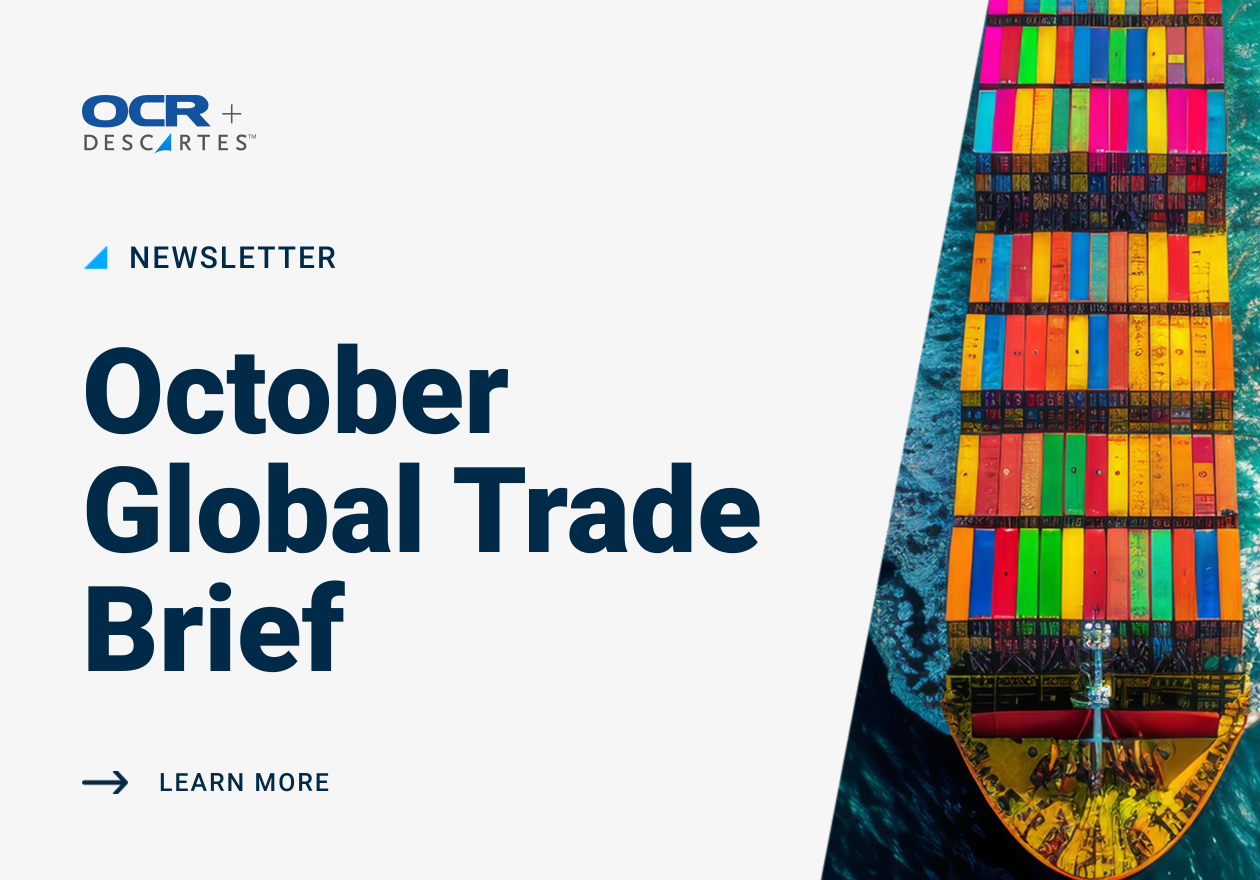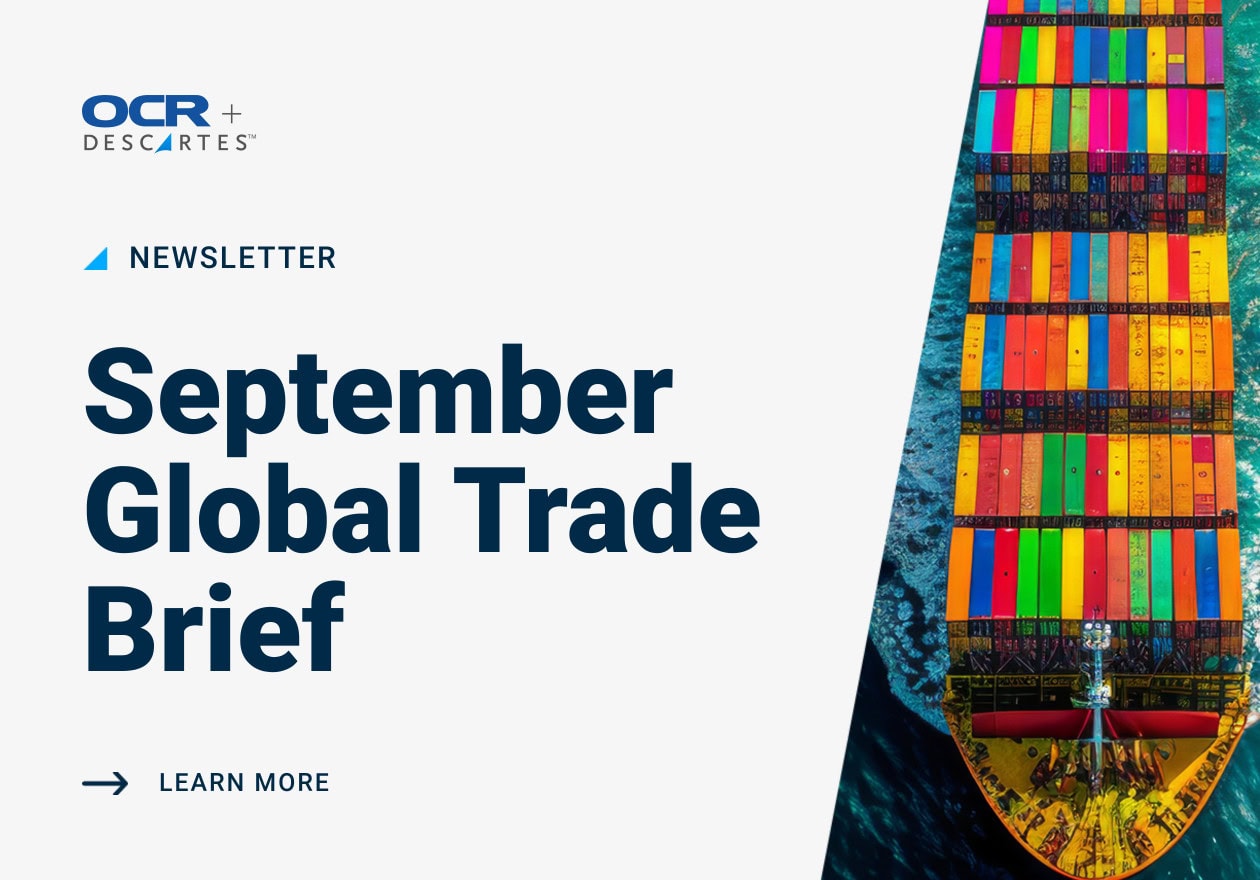TRUCKS CONTAINING SECTION 321 MERCHANDISE
Effective January 1, 2019, all commercial truck shipments containing “Section 321 merchandise” will be required to file an advance electronic manifest in accordance with the guidelines specified in the Trade Act of 2002.
CBP reported there are multiple ways to submit a Section 321 manifest. Companies not using the provided portal will need to hire a service provider or have an electronic data interchange (EDI) system in place to submit the information.
CBP also announced that beginning November 26, 2018, it will begin a phased approach for non-compliance with conveyances being referred to secondary for processing. Then starting January 1, 2019, carriers that make no attempt to comply with the electronic manifest requirement will be subject to a monetary penalty ($5000 for the first offence and $10,000 for subsequent offences).
HOW TO DO AN ENTRY FILING OF IMPORTS OF STEEL MILL ARTICLES AND ALUMINUM PRODUCTS THAT HAVE BEEN GRANTED RELIEF, UNDER SECTION 232 OF THE TRADE EXPANSION ACT?
The automated commercial environment (ACE) system has been programmed to process imports granted relief from quantitative limits.
Importers or filers must submit a copy of the approved Commerce Department quota product exclusion with the approved importer of record number as well as providing a copy to the quota and agriculture branch.
Only products from importer(s) designated in the product exclusion approved by Commerce are eligible for the exclusion from the section 232 measures.
CBP must receive and activate the product exclusion number before any quota exemption can be processed, and before goods subject to the quota exemption can be released.
SUMMARY OF THE RESULTS OF THE ANNUAL GSP ELIGIBILITY REVIEW BY USTR
As described in List I, the President denied all petitions to add products to the list of GSP-eligible products for all BDCs. The products in List I, however, remain eligible for duty-free preferences for least-developed beneficiary countries only:
- certain fresh pears (HTS 0808.30.40)
- certain melon and citrus fruit peel (HTS 0814.00.80)
- cottonseed (HTS 1207.29.00)
- crude sunflower-seed or safflower oil (HTS 1512.11.00)
- certain prepared or preserved apples (HTS 2008.99.05)
- p-Anisic acid, clofibrate, and 3-phenoxybenzoic acid (HTS 2918.99.05)
- certain aromatic carboxylic acids and their derivatives described in U.S. Note 3 (HTS 2918.99.43)
- certain aromatic carboxylic acids and their derivatives not covered in U.S. Note 3 (HTS 2918.99.47)
- certain rubber transmission V-belts (HTS 4010.33.30)
As described in List II, the President granted the petition to remove tart cherry juice concentrate and other cherry juice (HTS 2009.89.6011 and HTS 2009.89.6019) from GSP eligibility for Turkey. To reflect this change, cherry juice imported into the United States now falls under a new HTS category, 2009.89.65. Cherry juice from Turkey now enters the United States at the Normal Trade Relations (NTR) duty rate in column 1 of the HTS. In addition, the President denied the petition to remove nonadhesive plates and sheets (HTS 3920.51.50) from GSP for Indonesia and Thailand. These products will continue to enter the United States duty-free.
As described in List III, the President granted a petition to redesignate ammonium perrhenate (HTS 2841.90.20) from Kazakhstan to GSP. This product now enters the United States duty-free. The remaining redesignation petitions were denied: apple, quince and pear pastes and purees (HTS 2007.9948) from Argentina; sunflower seed oilcake (HTS 2306.30.00) from Argentina; certain odoriferous or flavoring compounds (HTS 2909.50.40) from Indonesia; fancy bovine leather (full grain, whole, unsplit) (HTS 4107.11.80) from Argentina; certain tropical plywood (HTS 4412.31.41) from Indonesia; granite monumental or building stone (HTS 6802.93.00) from India; and certain ferroniobium (HTS 7202.93.80) from Brazil. These products will continue to enter the United States at NTR duty rates.
As described in List IV, three articles exceeded the CNLs in 2017 for which no petition was received and now enter the United States at the NTR duty rates. These products are ethers of acyc monohydric alcohols (HTS 2909.19.18) and refined copper (HTS 7403.19.00) from Brazil, and washing machines (HTS 8450.20.00) from Thailand.
As described in List V, the President granted three petitions for CNL waivers: (1) edible birds’ nests (HTS 0410.00.00) from Thailand; (2) lithium carbonates (HTS2836.91.00) from Argentina; and (3) ferrosilicon chromium (HTS 7202.50.00) from Kazakhstan. These three products will continue to enter the United States duty-free. The following products did not receive a CNL waiver and are therefore subject to the NTR duty rates: essential oils of lemon (HTS 3301.03.00) from Argentina, and monumental or building stone (HTS 6802.99.00) from Brazil.
As described in List VI, the President did not grant de minimis waivers to 92 products that exceeded the 50 percent import share CNL but for which the aggregate value of all U.S. imports of that article was below the 2017 de minimis level of $23.5 million. These products now enter the United States at the NTR duty rate.
BANK SETTLES US SANCTIONS VIOLATIONS WITH OFAC FOR $54 MILLION
The settlement resolves OFAC’s investigation into Société Générale S.A.’s processing of transactions to or through the United States or U.S. financial institutions in a manner that removed, omitted, obscured, or otherwise failed to include references to OFAC-sanctioned parties in the information sent to U.S. financial institutions that were involved in the transactions. Société Générale S.A. processed 1,077 transactions totaling $5,560,452,994.36 in apparent violation of the Cuban Assets Control Regulations, 31 C.F.R. part 515; the Iranian Transactions and Sanctions Regulations, 31 C.F.R. part 560; and the Sudanese Sanctions Regulations, 31 C.F.R. part 538. This settlement with OFAC is part of a global settlement among Société Générale S.A., OFAC, the Board of Governors of the Federal Reserve System, the U.S. Department of Justice, the New York County District Attorney’s Office, the U.S. Attorney for the Southern District of New York, and the New York State Department of Financial Services.
USMCA – UNITED STATES-MEXICO-CANADA AGREEMENT IS SIGNED
The United States, Mexico, and Canada have reached an agreement to modernize the 24-year-old NAFTA into a 21st century, high-standard agreement. The new United States-Mexico-Canada Agreement (USMCA) will support mutually beneficial trade leading to freer markets, fairer trade, and robust economic growth in North America.
- The United States, Mexico, and Canada have reached an agreement on a modernized, high-standard Intellectual Property (IP) chapter that provides strong and effective protection and enforcement of IP rights critical to driving innovation, creating economic growth, and supporting American jobs.
- The new Digital Trade chapter contains the strongest disciplines on digital trade of any international agreement, providing a firm foundation for the expansion of trade and investment in the innovative products and services where the United States has a competitive advantage.
- To facilitate greater cross-border trade, the United States has reached an agreement with Mexico and Canada to raise their de minimis shipment value levels. Canada will raise its de minimis level for the first time in decades, from C$20 to C$40 for taxes. Canada will also provide for duty free shipments up to C$150. Mexico will continue to provide USD $50 tax free de minimis and also provide duty free shipments up to the equivalent level of USD $117. Shipment values up to these levels would enter with minimal formal entry procedures, making it easier for more businesses, especially small- and medium-sized ones, to be a part of cross-border trade. Canada will also allow a period of 90 days after entry for the importer to make payment of taxes
- For the first time in any U.S. trade agreement, this deal includes a prohibition on local data storage requirements in circumstances where a financial regulator has the access to data that it needs to fulfill its regulatory and supervisory mandate.
- The renegotiated agreement includes a chapter on Macroeconomic Policies and Exchange Rate Matters, with new policy and transparency commitments on currency issues. The chapter will address unfair currency practices by requiring high-standard commitments to refrain from competitive devaluations and targeting exchange rates, while significantly increasing transparency and providing mechanisms for accountability. This approach is unprecedented in the context of a trade agreement, and will help reinforce macroeconomic and exchange rate stability.
- One of President Trump’s principal objectives in the renegotiation is to ensure the agreement benefits American workers. The United States, Mexico, and Canada have agreed to a Labor chapter that brings labor obligations into the core of the agreement, makes them fully enforceable, and represents the strongest provisions of any trade agreement.
- The United States, Mexico, and Canada have agreed to the most advanced, most comprehensive, highest-standard chapter on the Environment of any trade agreement. Like the Labor chapter, the Environment chapter brings all environmental provisions into the core of the agreement and makes them enforceable.
WHAT IS NEW WITH U.S. DRAWBACK REPORTS
November 29, 2018, CBP will deploy a new drawback universe and reports to the Automated Commercial Environment (ACE). Claimants will be able to view data from their own drawback claims. Importers (as a non-claimant) will be able to view certain information associated with their own entry summaries listed in drawback claims. Drawback filers will be able to view data for the claims they have filed.
ES-601 drawback claim details: This report is available for importers and brokers and provides data on type 47 entry summaries. This report is available to drawback claimants via the importer role and to drawback filers via the broker role.
ES-609 non-claimant importer drawback header: This report allows importers that are non-claimants to view header and entry summary data from drawback claims they have submitted. This report is available using the importer role.
ES-610 non-claimant importer drawback details: This report allows importers that are non-claimants to view line level data for entry summaries associated with their import of record number for drawback claims they have submitted.
THE U.S. INTERNATIONAL TRADE COMMISSION DETERMINATIONS
The U.S. Commerce Department determined that the subject large diameter welded (LDW) pipes were subsidized and sold in the United States at less than fair value. According to the ITC release, four ITC commissioners identified three “like products” and one commissioner identified two “like products” in these investigations.
LDW carbon and alloy steel line pipe (line pipe)
- The ITC made an affirmative determination in its anti-dumping duty investigation of line pipe from China.
- All four commissioners voted to terminate the countervailing duty investigation of line pipe from China.
- The ITC made affirmative determinations in its anti-dumping and countervailing duty investigations of line pipe from India.
LDW carbon and alloy steel structural pipe (structural pipe)
- The ITC made affirmative determinations in its anti-dumping and countervailing duty investigations of structural pipe from China.
- All four commissioners voted to terminate the anti-dumping and countervailing duty investigations of structural pipe from India.
LDW stainless steel pipe (stainless steel pipe)
- The ITC made “negative determinations” in its anti-dumping and countervailing duty investigations of stainless-steel pipe from China and India.
S. industry is “materially injured by reason of imports” of common alloy aluminum sheet from China. The U.S. Commerce Department determined the common alloy aluminum sheets were being subsidized and sold in the United States at less than fair value. Commerce will issue anti-dumping and countervailing duty orders on imports of the product from China. The ITC also made “negative findings” concerning critical circumstances with regard to imports of the product from China. As a result, imports of common alloy aluminum sheet from China will not be subject to retroactive anti-dumping or countervailing duties.
The ITC separately determined that there is a reasonable indication that a U.S. industry was materially injured by reason of imports of magnesium from Israel that were allegedly subsidized and sold in the United States at less than fair value. As a result of the ITC’s affirmative determinations, Commerce will continue with its anti-dumping and countervailing duty investigations concerning imports of this product from Israel, with:
- Preliminary countervailing duty determinations due on or about January 17, 2019
- Preliminary anti-dumping duty determinations due on or about April 2, 2019



